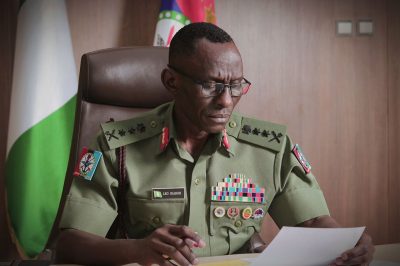Fight against insecurity politicised, no LG under terrorists’ control – CDS
The Chief of Defence Staff, General Lucky Irabor, has said no local government area in Nigeria is under the control of terrorists.
This is contrary to the claims by some governors, who said the Boko Haram/Islamic State for West Africa Province terrorists were in control of some local governments in their states.
Last year, the Chairman of the Shiroro Local Government Area of Niger State, Suleiman Chukumba, said over 500 communities in eight wards of had been taken over by Boko Haram and other insurgents.
Governor Abubakar Bello also raised the alarm that Boko Haram members had hoisted their flag in some communities in the Shiroro Local Government Area.
On January 13, 2022, Borno State Governor, Babagana Zulum, stated that the Abadam and Guzamala local government areas of the state were under the control of the Boko Haram sect.
Irabor, who spoke at the 21st Century Chronicle Roundtable in Abuja, said security challenges in the country had been politicised.
He spoke on the topic, ‘Going for Broke: Fighting insecurity in Nigeria’.
Irabor stated, “I’m sure many of us remember the state of emergency imposed on local governments in the North-East zone, especially parts of Borno State, as well as Adamawa and Yobe states.
“That was the time when there was sort of confusion because never in our history have we had such a step. There were no measures and protocols outlined to manage the situation.
“Looking at these issues, the military had to enforce measures by way of crafting operations to suit the peculiarities of every geo-political zone. We then had Operation Lafiya Dole, now Hadin Kai in the North-East; Hadarin Daji in the North-West and different operations in the North-Central.
“There has been recovery of space. At the peak of the insurgency, 14 local governments, especially in Borno State, were under the control of Boko Haram. Currently, there is no local government under their control. Of course they have a presence in a number of local governments.
“Equally in Yobe State, almost four local governments were under the control of Boko Haram as well as in Adamawa, but currently, Boko Haram is not in control of any local government.
“We have recovered arms and ammunition. We have arrested some of these terrorists, while some of them are surrendering. Right now, the narratives are beginning to change.
“The military approach in managing insecurity was at one point politicised. That has not been completely eliminated.
“Politicisation of the military approach became so profound that the good intentions of the military were skewed. That meant that there was no united front.”
The CDS also said he supported the call for community policing.
A good number of members of the Civilian Joint Task Force, he stated, had been absorbed into the armed forces.
Irabor said, “We have absorbed a good number of the CJTF. It is an ongoing process; however, deploying them back where they come from does not fit in completely with our code of ethics.
“Otherwise, we’ll no longer be an armed force but the police. That kind of arrangement is best for the police.
“That is the reason why I join those advocating community policing. Yes, there is a community policing framework currently, but it has to be escalated.
“The NPF is already working on this to see how it can boost community policing mechanisms beyond what it is right now.”
The CDS added that 80 per cent of the Nigerian Armed Forces personnel deployed across the 36 states of the federation were performing police duties.
Irabor stated, “Nigerians need to understand the basis of our involvement – internal confrontations. Of course, our constitution mandates the armed forces to play a supporting role to the civil authority; in this case the police, in circumstances that we have found ourselves in.
“Some of the reasons why the security challenges have assumed a proportion that became necessary for the armed forces to come in even though it was intended to give support to the Nigeria Police and other civil agencies, the manifestation of these insecurities have assumed such a proportion that the military will be at the forefront of addressing them.”
He called for more resources for defence and security so as to meet the yearning needs.
Irabor also said the weak judicial procedure of managing terrorism cases must be strengthened.
He lamented the over-reliance on foreign countries for military hardware, saying security must be given priority in order for development to thrive.
In his remarks, the Chairman on the occasion, Senator Kashim Shettima, said the economy must accommodate the teaming youths in order to tame insecurity.
He restated the call to regulate the social media, adding that the Nigerian media deserved commendation and not condemnation.
Speaking on the topic, ‘Reducing tension as election year approaches’, the Special Assistant to the President, Femi Adesina, described elections in Nigeria as tension generator.
He added that politicians had been flouting the law by campaigning before the assigned period.
Adesina stated, “Election in Nigeria is a natural tension generator and if you look at the history of elections, you will see that elections are worse than the previous ones and it got to a head in 2007. The reserve is what is happening in other parts of the world.
“Campaign has already started against the laid down rule; it started as early as when the second term of the President began. Today, it is now worse as people are crisscrossing the country. I think those jumping the gun should be penalised.
“It is very important that we should follow the rules. When INEC said we should start campaigning, we should.
“The 2023 elections will show if we are improving or have not learnt anything.
“It pays nobody to generate tension.”
He, however, said the Electoral Act would take days, not weeks, before it is signed to law. (Punch)


